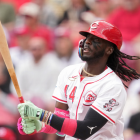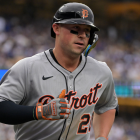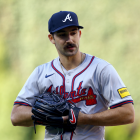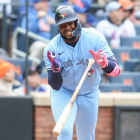It's a moment all baseball players dream of from the moment they first pick up a bat: Hitting a dramatic home run in Game 7 of the World Series. Rajai Davis waited 36 years and 1,219 major-league games (counting regular season and playoffs) to pull it off. His game-tying two-run homer in the bottom of the eighth inning of Game 7, off the hardest-throwing pitcher of all time, sent shockwaves throughout the baseball world. For a 38th-round draft pick who clawed his way to an 11-year big-league career based far more on speed than power, it was a damn miracle.
Davis' home run would become something of a footnote, thanks to the Chicago Cubscompleting a 3-1 series comeback to win their first World Series title in 108 years. But the moment will still resonate for Davis, and many of us who watched that night, for years to come.
I recently sat down with Davis at the MLB Players Association Players Trust charity poker tournament to discuss his long journey to the big leagues, the incremental improvements every player must make to reach and then thrive in the Show, what it felt like to play a pivotal role in a historic moment, and the lessons he has learned from a life in baseball.
Davis was so generous with his time, we ended up talking for well over an hour. This is part two of a two-part series. You can find Part 1 here. Enjoy!
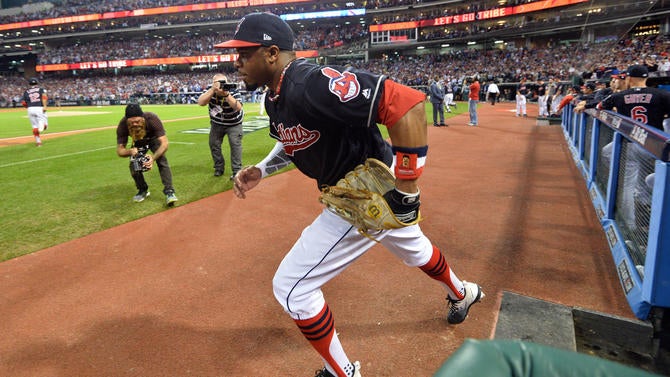
Rajai Davis: The first major leaguer I got to interact with was Gary Redus.
Jonah Keri: A great basestealer.
RD: Yeah. He's the one who showed me the fundamentals of basestealing. He gave me the very basics of what I use today. Even fielding in the outfield, I got that from him. All along you're just learning, learning, continuously learning. Even now, I still want to learn how to get better. Learn how to steal better. So I find other methods how to do that. Just by talking to people and learning what they know. I don't know everything, but I want to.
JK: So the search for knowledge I love. And the other thing I love is the real nitty-gritty of basestealing. What are your tells, the real specific things you look for when trying to steal?
RD: I learned a lot from Coco Crisp, I learned a lot from Sandy Alomar. Probably most people don't know he's excellent at picking up left-handers and right-handers. That's what I really wanted to know.
JK: You get picked off, you're scared.
RD: Yeah. The lefties, because I was actually really good at stealing against left-handed pitchers, but I don't get a lot of opportunities against right-handers to learn some of these things.
JK: Especially when you were not quite a platoon player but a part-time guy.
RD: Right. And that was a real, real key. So Sandy gave me some tips just to look for this, each pitcher is a little different. They don't all do the same thing but they all do something. There was only one guy we could find that we couldn't read.
JK: Who was that?
RD: That was Derek Holland. He was the one guy you're just gonna guess. You're just guessing against him. You either guess right or you guess wrong.
JK: Do you think pitchers work on that and try to beat their bad habits?
RD: He does that.
JK: I've heard he's a very smart guy.
RD: Most guys don't. Most guys don't work as hard as he does.
JK: Well they're focusing on striking out the guy who's hitting .320 with 50 homers, right?
RD: Yeah. I think it was more of a focus on hitters: If they don't get on base, you don't have to worry about it. But as a secondary skill to work on would be to be able to hold them close. If you can hold them close, at least have them thinking you're going to come over, I think that helps. The one thing is their gloves. A lot of them do something particular with their gloves.
JK: Like they'll come set, and then once they're doing that, that's it, they're not going to mess with it again.
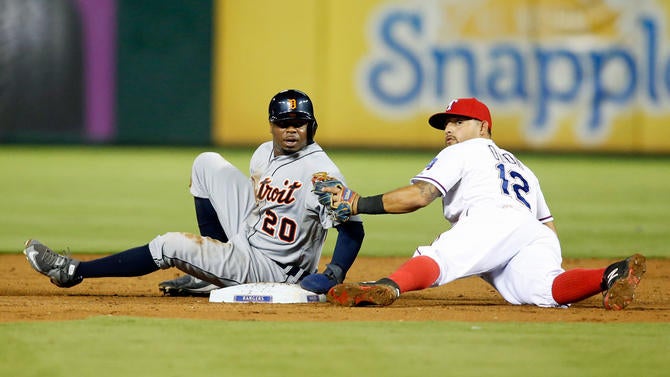
RD: Yeah, they'll just do something different when they're going home or coming over. Not all of them do it, and it always changes. And then sometimes they change too, so you have to go with the change. Sometimes I'm able to tell, so you'll watch videos or pick something up.
JK: The Indians especially have very good video guys, they always have.
RD: Yeah. They'll change once you get out there. "Wait, hold up now."
JK: You have to throw out your book. You have to start over.
RD: Yeah, right. But during the playoffs I recognized one of the guys was doing this one thing in the video, and he did it, and I stole a base on him. So the next time I get on base, he actually changed his format.
JK: Within the same game?
RD: In the game!
JK: At that point, when you get somebody to change, you've won.
RD: Yeah. Now you know you've got his focus when you're on base. So I was able to get to third on him. That's the ultimate goal, get them to focus on you so that perhaps they'll make a mistake and the hitter will make them pay.
JK: You're in your mid-30s now. I've had discussions, when I've talked to Coco he was in his mid-30s. Lofton was retired. Tim Raines was retired. They talk about what it's like when you're 22 versus what it's like when you're 35. How much of a speed difference do you think there is? You seem to be still pretty fast. Do you feel like you've lost anything? Half a step? Full step? Where are you?
RD: I don't feel like I've lost any steps. I feel like I've gotten faster since my Oakland days. When I was in Oakland, I ran a 6.5-second 60. A few years later after Oakland, I ran a 60 again, it was 6.09 seconds. Because of technique, because of form, because of training, because of nutrition, because of a lot of different things.
JK: And you're better at reading pitchers now that you're older.
RD: And more experienced.
JK: This is how you lead the league in steals when you're 35 years old.
RD: [laughs] Yeah. These come into play. You have to take care of your body and you have to work at that.
JK: Were you not as good at that when you got into the big leagues?
RD: No. I was just running. That's why I got caught.
JK: You can get away with stuff when you're young.
RD: You can, and they let me get away with it. I just wanted the numbers, I thought it was all about the numbers when I was just coming up. Now, I'm more cautious. When I was young, I would do some crazy things. Like literally, I did crazy things.
JK: Give me an example.
RD: I'll give you two examples. One, and I did it last year but I did it more often back then, when catchers would throw back to the pitcher I did these kind of things.
JK: Oh, you'd run while the ball was in the air. Did it work?
RD: Oh yeah. I never got caught, ever.
JK: So it's not crazy, it's good.
RD: I've done it like seven or eight times in the big leagues.
JK: When they lollipop you, then especially.
RD: Even when they didn't lollipop, I would just go off the top. And I did it last year too, but I would hit a single to right fielders, knowing guys have good arms. Guys who have good arms, that's who you do it with. I'd run just enough to entice them to throw to first, and I'd go to second. [laughs] I did that, not only to a right fielder, but I'd go first to third and stop halfway between second and third when the ball was hit to left field.
JK: He's right in front of you.
RD: Right in front of me. And act like I'm going to go back. He'd throw it, I go to third.
JK: That's Little League stuff, man. That's great.
RD: That's the kind of thing I would do. I don't do that now, just because you can only get away with that so many times in the big leagues.
JK: They have the book on you too.
RD: Yeah [laughs].
JK: But especially I'm thinking of a guy like Vladimir Guerrero who not only had a big arm but was very aggressive.
RD: Right.
JK: There are guys like that all over the league.
RD: Yeah. You take advantage of the aggressive guys.
JK: I do want to ask you about this past season. Before we get to the playoffs, just that run in Cleveland. This was a team that hadn't had a ton of success in the few years leading into it. You go over there, and it starts to build as the season goes on. That's no Brantley, no Gomes, no Salazar, no Carrasco. This is a team that makes do, that figures it out, the pieces are plugged in and it just seems to work. Tell me about that experience of being in that clubhouse with that team. Before we even get to the World Series, just getting to the playoffs with a team that maybe shouldn't have, that you wouldn't have thought so but it happened.
RD: Well first off, we had 40 guys who all believed in Tito's philosophy. The main ingredient is that we as a collective group valued winning more than our own performance the majority of the time.
JK: Which is a simple thing but not easy to pull off, probably.
RD: Yes, right. But that means doing the little things, getting guys over, getting guys in especially when the infield is back, taking advantage of when they're giving you runs. Take them.
JK: Or the extra base.
RD: Or the extra base.
JK: The extra out.
RD: You know? Being able to capitalize all year long, being able to pitch well, play good defense, and we had guys who wanted to win and get better every day. They wanted to. So they're getting into the weight room, they've got good attitudes every day. Even when things would happen that were adverse or things that players didn't like. This was the mindset. We shall overcome this. Whatever it is. Whatever it was. That was our motto. We're going to overcome. Somebody would take away this kind of food, we can overcome this [laughs].
JK: Because clubhouses can fall apart over little things like that.
RD: Right, right, right. That was one thing that helped with the leadership that was in the clubhouse. Mike Napoli, a big, big contributor to that.
JK: That's what everybody says. The story that I heard about Napoli, it's an off-field story but it's a good story. They signed him and the first thing he did was go to the casino, the first night.
RD: Yes.
JK: I guess this story was true. He goes to the casino, he gambles, he wins a lot of money.
RD: Yeah.
JK: And he was dropping $10,000 tips.
RD: Yeah.
JK: That's true? That doesn't surprise me.
RD: Not only that, in the playoffs we were actually really generous as far as giving shares to our people that were helping us out.
JK: Other employees?
RD: Very generous.
JK: And that comes from having a cohesive clubhouse.
RD: Close relationships.
JK: That has to be Francona a little bit too.
RD: Yeah, that was him. That was Tito. That was also the guys who wanted this. And it's part of the organization, because they're the ones that got these people in the clubhouse, so they know what they're looking for. From the beginning, because a lot of them they had to develop into these players. So they know what kind of player they want in their clubhouse, and they got what they needed. We all really really worked, all of us worked together, it was such a fun year. Guys were having fun all year.
JK: That was a city that really ... the Cavs happened last year, there was a shift. It was like oh, Cleveland can be a winning city now. I felt it walking around downtown, which wasn't the case before.
RD: The thing about it was, after the Cavs won it, after that parade, hardly any of us could get any of the stadium because there was a parade [laughs] right in front of our stadium, and you couldn't even drive in, literally, you could not drive in. You had to either get a ride and get dropped off and walk blocks to get in, or you were going to be stuck in traffic. And the problem is, I didn't have the problem most of the guys did getting to the game the day of the parade, we had a 7 pm game, most of the guys get to the park about 5 or 6 pm, because of all the traffic.
JK: Lindor is sprinting in with cleats on.
RD: [laughs] Yeah. And I think we end up going on a 14-game winning streak.
JK: Oh wow, I knew there was a big streak, I didn't know it was right then.
RD: That's when it started. That was the day that it started.
JK: Go figure. There's a couple of playoff moments ...
[interview is interrupted]
JK (into recorder, while Davis is occupied): Barry Bonds just came over and shook Rajai's hand. Barry Bonds is my white whale. (COME DO A PODCAST WITH ME, BARRY!)
JK (back to interview): So I want to ask you about the Ryan Merritt game. There were a lot of great things that happened in the playoffs, but this guy had not played, he just came absolutely out of nowhere. You talked about idea of 40 men, he's somewhere close to #40. Having a rookie like that come up, you just turn the guy loose and that's it? You give him a pep talk? How does it come to be that something like that happens, it was just an amazing thing?
RD: That was all him. That was his nature. That was in his personality. His personality is, I'm just coming out here to pitch.
JK: It doesn't matter if it's April.
RD: Yeah. It doesn't matter where I'm at. And he was just going out there and trusting the catcher, trusting his stuff, because he has the stuff. I got a chance to see him and his stuff, and he has some good stuff.
JK: And people say "stuff," they confuse it. They think stuff is like Aroldis's stuff, it's 100 miles an hour. Dude throws 86 but he's got stuff, he'll locate, that curve ball is lethal.
RD: Yeah. And he's got deception.
JK: He really does.
RD: He's got a lot of deception, even against right-handed hitters. It's tough to pick it up. It's just tough. He hides the ball so well. So when he comes out, then you see the ball, it's like oooooh! It's just tough, square. Unfortunately he'll have his days where he's going to get hit because his stuff is not as sharp, but every pitcher goes through that. It's just battling through those moments. For him to go out there and be so confident, so relaxed, so calm.
JK: It seems like throughout the whole team it was like that.
RD: I think that's because of players making it their job to make him feel a part of the bigger team. That was players, and I think in the olden days, it was tough for rookies to come in.
JK: There was a hazing process almost.
RD: Right. That's not what we did. It was the opposite. We accepted him. Because hey, we needed him and we wanted him to perform well.
JK: You guys don't have a $250 million payroll. There are going to be rookies on the team.
RD: Yeah. You need that kind of player, and not only him, but even when [Abraham] Almonte came back, we needed him. And it's embracing the players as one unit, one team, for one goal, that was to win. That was our goal, to win. And we were able to work together and all collectively to achieve that. I think guys felt comfortable coming to the clubhouse. Andrew Miller came into the clubhouse and just shone. He was already doing that anyway.
JK: But it's a new place.
RD: He was willing to accept any role when he came in. Any role. And so was our closer. I don't know if they mentioned that, but he was the same position. That's part Tito, part players. Because players want to win, and Tito had enough knowledge and wisdom to talk about it with the players, respectfully, man to man. "We're going to talk about it, we're going to talk it out. If you don't like it, let me know. That was the up front kind of character that Tito displayed all year long. That is the kind of guy he is. So that's needed, rarely found but it's needed. I suppose it's hard to do in this game, I don't know, it depends on who you are.
JK: It seems like two of the best managers in baseball were the ones that managed against each other in the World Series.
RD: Yeah.
JK: Guys that really connected with players. I want to ask you about the feeling of Game 1 of the World Series. You're standing on the baselines, the bunting is there, the full stadium. The 99.99999% of the world, they're never going to get to experience it. What is it like? The shivers, the lights, the noise, the other players, to stand there and be like, "This is it. I'm doing this thing."
RD: I really really noticed a big difference in the World Series Game 1. And it started before the game even started. I'm talking about going to the World Series, Game 1, going out for batting practice and seeing all of the media on the sidelines. The TV cameras on both sides.
So I asked one of the men who was working the grounds, "How many people do they really have on the field at any one time?" They told me there were 700 to 900 people at a time. And this was just media. That's when I knew how big the World Series is.
JK: Three hours before the game.
RD: Three hours before the game. But that's why I knew that this was actually a big deal. I didn't really get it until I was actually in it. How big of a deal a World Series is.
JK: Most of your teammates were in the same situation. Napoli had some experience, but Lindor, Kipnis, these guys had never played in that environment. Great players, but they just hadn't experienced it.
OK there are a million questions that I could ask you, how about this. Every ballpark is interesting but what about stepping onto the field for Game 3 at Wrigley. Was it just, "We've got to kick these guys' asses?" Or was it, "Oh, we're at Wrigley Field right now in the World Series." Did you feel that as a member of the opposing team?
RD: I think we were just going out there to do a job. We weren't getting ahead of it. It was obviously tied at that game and we wanted to go out there.
JK: That atmosphere was bonkers in Game 3.
RD: Oh yeah. It was crazy. I think we won with one run in the game.
JK: Yeah. Great game.
RD: Could have gone either way. It happened to go our way, fortunately. That worked out. But that environment was absolutely awesome, actually.
JK: Fans are on top of you in that stadium.
RD: It was awesome. It was a great, great, great experience. When they did anything good, their fans went crazy. They went crazy. And that's why we play. It's not just being at home and our home field advantage, but on the road you do something special and you hear the fans go, "Ooh! Aah!" That's when you know you've done something. It's just fun to play. I enjoyed that kind of environment. If we do something really well, they all see it. They all recognize it.
JK: And 40 million people on TV see it too. Okay, so I am going to ask you about the Chapman at-bat. Aside from the emotion of it, you always choke up on the bat. You're a guy who chokes up on the bat. I swear, when that pitch, you can see the replays of it, your hands are up here. You're holding like a foot of bat. Is that just because Chapman is throwing 102 mph and that's what you've got to do? Are you even trying to hit the ball over the fence at that point, or are you just like, I've got to make contact against this guy?
RD: I definitely wasn't trying to hit the baseball over the fence. But I wasn't just trying to hit a single either. I was actually swinging the bat, I was swinging and I felt good. There's at-bats where you're like, "I don't know, I don't know."
JK: You saw it pretty well coming out of his hand?
RD: I saw it awesome. I saw it really really well. And I think it helped that I felt comfortable facing him, as opposed to my first two or three at-bats against him, I felt uncomfortable facing him.
JK: It's 104 mph. You're not used to it. Guys don't do that.
RD: [laughs] Right.
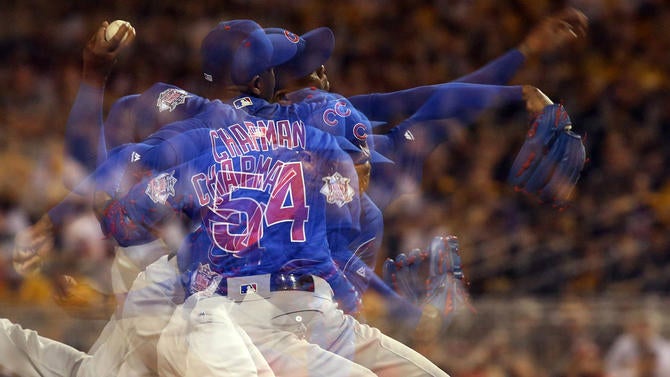
JK: Even Miller, as good as he is, and he's great, is not quite at that velocity.
RD: Right.
JK: So you're picking it up better with your eye, you're getting a sense for it, you're locked in, you make contact. Aside from the fact that you've got to run now, are you thinking, "This is gone"?
RD: I didn't think, I was hoping that it was gone. I knew that it had a good trajectory, I knew that I hit it really well.
JK: It was a line drive.
RD: Yeah. I knew I hit it really well. And I knew that I hit it really well because by the time I got in the box it was going out to the outfielder, so it was like, this is going to be a good shot. But I know that it's a 19-foot wall over there in left. I've already hit that wall a few times, when I thought it should have gone out. But I hit such a good line. I didn't know until I hit first base, and then what a relief! "Thank you God." What I was thinking was, "Man, how'd I end up with this opportunity?"
JK: Even if you struck out, just to be allowed to be in that situation.
RD: Yeah. I was in this situation. Ramirez has to get a hit, okay? There's two outs, Ramirez has to get a hit up the middle. The shortstop Russell misses the ball! He overslides and misses it.
JK: He's a pretty good fielder, he doesn't usually do that.
RD: Yeah. Then Guyer comes up, goes to 3-2, then hits a double.
JK: Guyer's a pretty good hitter against lefties.
RD: Yeah, but he's throwing 102, literally 102 to him every pitch.
JK: Yeah, he was. He was not throwing sliders.
RD: He didn't drop them. And so now we've got the tying run at the plate. This is what I was thinking the entire game: I'm supposed to do something great. The entire Series. Before we even started the Series, I was talking to a buddy of mine who I'd played with, and he was telling me, Rajai, you're going to have a big Series. A big Series. He planted a seed in me that started me believing, from the very start. I believe it, I believe it, but I'm like, when is this going to come? When is this time?
JK: That game was like so-so for you, there was a ball that went over your head.
RD: Yeah.
JK: It wasn't terrible, but you weren't like 4 for 4 with 12 diving catches by any means.
RD: Right, right. And so when is this thing going to happen? When is it going to happen? I'm thinking it's going to happen at the plate. That was my thought, that I wanted it to happen at the plate. The kind of play I could have made in the outfield if I had been playing a little bigger, but I didn't, or maybe I got a better jump. I didn't. And so now to recognize, as I'm walking up, "Oh, wait wait hold up, there's a man on 2nd, this is the time!" I recognized it. "This is my time right now, to shine." So I'm up there, I'm asking God, "Man, help me out! Please, help me! [laughs] Help me, send your angels!"
JK: I feel like even if you're not a religious person, you'd be like "Alright, maybe if there is a God, let's see if he exists right now."
RD: Yeah. And so that's my prayer, "Help me, please, thank you for your help, thank you." And it's funny that it doesn't happen on the first pitch. It doesn't happen on the second pitch. Not the third, not the fourth. And we end up going 2-2, and I remember fouling off a pitch, and it was 102, on the black.
JK: Geez! [laughs]
RD: I remember I saw it so well though, in a straight line, and I said, "Oh, I can just follow it out." And I just kind of reached out for it.
JK: Wow that's control! That's impressive.
RD: Yeah, I was actually able to see it really well then. That pitch I saw really really well. And then the next one came in I believe. But before he threw it, it was like I saw the trajectory out of his hand, before it came. And I could see my swing hitting it like here, and so after he threw it, I said, "Ooh! There it is!" It's just like I was thinking.
JK: It's like The Matrix, like it all becomes clear.
RD: Yeah! Everything slowed down.
JK: Yeah.
RD: So everything slows down, and I swing, and POP! I'm like, "Wooh, I like the sound of that." Because in my thoughts, that's the sound I want to hear. "Pop." That's what I want to hear. "Pop." Every time I swing. "Pop." That's the sound that rings through my head. That sound, that hard sound that you've made solid contact with a major league baseball. And when I saw the trajectory, "Did this just happen? [laughs] Did it? Please! Get out! Get out! Get out! Get out!" That's what you say under your breath. And once it goes out of the stadium, I'm like, "Oh. My. Lord. What just happened?" I had to give honor to my Lord for doing that. And as I'm jogging around second, when I get to third ...
JK: You see your teammates.
RD: I see all of them!
JK: Out of the dugout!
RD: Out of it!

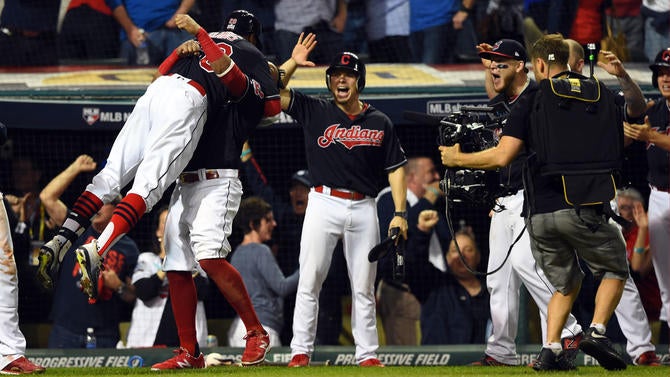
JK: That doesn't happen in June against the Twins.
RD: And this is what I'm saying. I didn't see this all year long. And we hit a number of home runs, big home runs, little home runs, I never saw everyone out of the dugout celebrating like they'd hit it. [laughs]
JK: Yeah. Yeah! Like it's a walkoff home run.
RD: Like it's a walkoff. And that was so amazing to me so I had to just point at it, because I'd never seen that before.
JK: Yeah, yeah.
RD: That was something new to me. It was like, "Wow, what? This is really big. What just happened is really big. Now I see the full extent of it because look at my teammates, they're really excited in this moment. I'm really excited but, I'm looking at them, like, "Man! This is unbelievable!" And Guyer is at the plate just waiting for me. And I hit him with two high-fives. One high-five wasn't enough. Two. Two and the body, the body check. I get to the dugout and Santana picks me up, "Whoaaa! This is real!" We had this celebration outside of the dugout before I even get in. It was crazy. What an experience.
JK: You wait your whole life for one moment like that.
RD: I prepared 16 professional years for one defining moment. 16 years I prepared professionally, that's how I look at it. I was in preparation for 16 years for that one defining moment.
![[object Object] Logo](https://sportshub.cbsistatic.com/i/2020/04/22/e9ceb731-8b3f-4c60-98fe-090ab66a2997/screen-shot-2020-04-22-at-11-04-56-am.png)









